[Overseas comparison] A Red Bull fan explains the ingredients and effects
Does Japanese Red Bull Have Less Effect Than American Red Bull?
The phrase "Japanese Red Bull is less effective compared to American Red Bull" is often heard from non-enthusiast groups, but the truth is, if you take a close look at the ingredient lists of both the American and Japanese versions of Red Bull, you'll realize that there isn't a significant difference in their effects, and in fact, no special effects can be gained from either.
Below, I have summarized the ingredients of both Japanese and American Red Bull, along with the effects of each individual ingredient, so please take a look.
Main Ingredients and Effects of Japanese Red Bull
Sugar
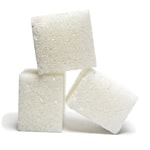 The ingredient that makes up the largest portion of Red Bull is sugar. To put it in perspective, the sugar content in Red Bull (11g/100ml) is actually almost the same as that of Coca-Cola (11.3g/100ml).
The ingredient that makes up the largest portion of Red Bull is sugar. To put it in perspective, the sugar content in Red Bull (11g/100ml) is actually almost the same as that of Coca-Cola (11.3g/100ml).
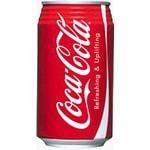 Naturally, there are plenty of carbonated drinks that contain even more sugar than Red Bull. The anti-soda movement in the U.S. is heating up because sugary drinks (including energy drinks) contribute to obesity.
Naturally, there are plenty of carbonated drinks that contain even more sugar than Red Bull. The anti-soda movement in the U.S. is heating up because sugary drinks (including energy drinks) contribute to obesity.
The amount of sugar in Red Bull is not particularly high compared to other drinks, and sugar is present in large quantities in virtually all sodas, without offering any special effects or benefits by itself.
The effect of sugar is to rapidly raise blood sugar levels, providing a quick energy boost. Drinking it before exercise or weight training can help prevent fatigue from the outset. Sports drinks and carb drinks offer similar effects.
Caffeine
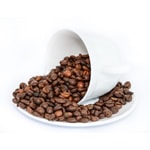 Many people are curious about the caffeine content in energy drinks like Red Bull. The caffeine content in Japanese Red Bull (185ml and 250ml) is only 80mg, which is equivalent to or less than a cup of coffee.
Many people are curious about the caffeine content in energy drinks like Red Bull. The caffeine content in Japanese Red Bull (185ml and 250ml) is only 80mg, which is equivalent to or less than a cup of coffee.
Whether it's a lot or not depends on perspective. Many people drink several cups of coffee at work every day.
The effect of caffeine is its stimulating properties, commonly used to combat sleepiness. People who are not used to caffeine might find themselves more awake after consuming just 80mg. It also helps with concentration, and it is said to aid in fat burning. Caffeine peaks about 1 to 2 hours after consumption.
However, the caffeine content in Red Bull is equivalent to a cup of coffee, so its effect is nearly identical to drinking coffee. If you're hoping for an energy boost, it’s likely that you won’t feel much difference from a regular cup of coffee. For more information on caffeine content and addiction, check out this article on energy drink caffeine and addiction.
Arginine
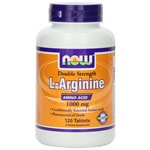 Arginine is a representative ingredient found in many Japanese energy drinks. Drin-kun also uses arginine as a supplement during training. The effects of arginine include vasodilation and promoting the release of growth hormones. During training, it can help enhance the pump effect.
Arginine is a representative ingredient found in many Japanese energy drinks. Drin-kun also uses arginine as a supplement during training. The effects of arginine include vasodilation and promoting the release of growth hormones. During training, it can help enhance the pump effect.
Supplements usually contain about 5,000mg of arginine, maybe even more. In contrast, Red Bull contains just 120mg of arginine. With this small amount, I don’t think it’s possible to experience any significant effects. If it does have an effect, I wonder what would happen if you took 5,000mg...
Vitamin B Group
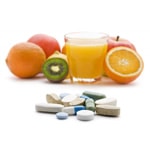 The B vitamins are essential for sugar metabolism. They play a supporting role in promoting metabolism and ensuring smooth energy transmission. Without enough of these vitamins, even if you keep consuming sugar, your body won’t be able to process it properly. By the way, the yellow color of your urine after drinking Red Bull is due to the B vitamins.
The B vitamins are essential for sugar metabolism. They play a supporting role in promoting metabolism and ensuring smooth energy transmission. Without enough of these vitamins, even if you keep consuming sugar, your body won’t be able to process it properly. By the way, the yellow color of your urine after drinking Red Bull is due to the B vitamins.
The amount of B vitamins in Red Bull is not particularly high, being less than half the amount in products like Chocola BB.
No Significant Difference in Effects Between American and Other International Red Bulls
There’s no claim that American Red Bull is stronger or more effective. Depending on the size, the caffeine content is around 100mg, which is moderate. The main ingredient is still sugar. A key difference between Japanese and international Red Bulls is the inclusion of taurine, but even that is only 1,000mg, so it’s unlikely that this would create a noticeable difference in effect.
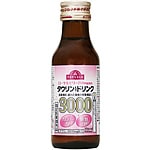 By the way, 1,000mg of taurine is comparable to cheap, 50-yen health drinks. Recently, due to deflation, you can even find health drinks containing 3,000mg of taurine for about 100 yen. If taurine in American Red Bull were that powerful, the low-cost, mass-market health drinks in Japan, which come in small bottles (you can drink several at once), would surely be much more potent and would have already become a problem.
By the way, 1,000mg of taurine is comparable to cheap, 50-yen health drinks. Recently, due to deflation, you can even find health drinks containing 3,000mg of taurine for about 100 yen. If taurine in American Red Bull were that powerful, the low-cost, mass-market health drinks in Japan, which come in small bottles (you can drink several at once), would surely be much more potent and would have already become a problem.
Many people mistakenly think that international Red Bull contains some super powerful ingredient. However, if you actually look at the ingredient list on the back of the can, you’ll see that there’s nothing particularly problematic. It’s just a typical list of ingredients that you might find in soda or coffee.
People Think Red Bull is Effective Because It’s Expensive
It's natural to assume that higher-priced products must be more effective or valuable. In Japan, the 185ml mini-can costs around 200 yen, which seems small but expensive, leading many people to believe that it must be effective or that drinking too much will cause side effects.
As mentioned earlier, however, you can’t expect that much of an effect, and drinking two or three cans won’t lead to severe health problems.
By contrast, American Red Bull is sold in 250ml cans for nearly 300 yen. The 355ml cans are typically over 400 yen. This makes it hard to casually drink, and Red Bull is expensive everywhere around the world. Even in countries with lower living costs, it’s still noticeably expensive.
Drin-kun has traveled to many countries to buy energy drinks, so if you're interested, check out the “Energy Drink Journey” section for real-world info.
Comparing Ingredients of Other Red Bull Drinks
| Ingredient (per 100ml) | Red Bull | Coca-Cola | Chocola BB Joma |
| Energy | 46kcal | 45kcal | 17kcal |
| Protein | 0g | 0g | 0.4g |
| Fat | 0g | 0g | 0g |
| Carbohydrates | 10.8g | 11.3g | 4g |
| Sodium | 80mg | 0g | 0g |
| Niacin | 3mg | - | 11mg |
| Pantothenic acid | 2mg | - | - |
| Vitamin B6 | 2mg | - | 2.6mg |
| Vitamin B2 | 0.09mg | - | 8mg |
| Vitamin B12 | 2μg | - | - |
I’ve summarized the ingredients of Red Bull, Coca-Cola, and Chocola BB Joma, the successor product to Joma, in a table so you can see how they compare.
Red Bull Faces Class-Action Lawsuit in the U.S. for Lack of Effect
In 2013, a class-action lawsuit was filed in the U.S. against Red Bull, claiming that the drink did not deliver the promised effects.
The lawsuit argued that while Red Bull might have some effect due to its caffeine content (equivalent to a cup of coffee), other ingredients offered no significant benefits. As a result of the lawsuit, Red Bull agreed to pay a settlement of 13 million dollars to consumers who had purchased Red Bull over the past 12 years (no receipt required).
It’s embarrassing to say things like “American Red Bull is stronger than Japanese Red Bull” or “Japanese Red Bull lacks taurine and is weaker,” isn’t it?
Summary of Red Bull’s Ingredients and Effects
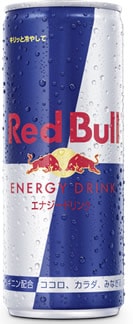 As you can see, Red Bull doesn’t contain any particularly special ingredients, and the quantities of ingredients are not large enough to produce significant effects. With sugar equivalent to that in cola, caffeine equivalent to a cup of coffee, B vitamins in lower amounts than vitamin drinks, and arginine in such small amounts that it barely has an effect, if you feel any significant benefits from Red Bull, it’s likely a placebo effect.
As you can see, Red Bull doesn’t contain any particularly special ingredients, and the quantities of ingredients are not large enough to produce significant effects. With sugar equivalent to that in cola, caffeine equivalent to a cup of coffee, B vitamins in lower amounts than vitamin drinks, and arginine in such small amounts that it barely has an effect, if you feel any significant benefits from Red Bull, it’s likely a placebo effect.
Red Bull is not a magical drink with special ingredients, and rather than expecting drastic effects, it’s better to just enjoy it for what it is! This is the stance that most energy drink enthusiasts take.
At the same time, there are blogs that try to force a connection between the effects of energy drinks like Red Bull, which is misleading for regular consumers who might be influenced by these claims. As mentioned at the beginning of this article, there are no noticeable effects for most people. Rather than focusing on whether it works or not, the goal should be to enjoy the taste and fun of Red Bull.
For those interested in collecting and reviewing Red Bulls from around the world, check out Energy Drink Mania's Red Bull collection and reviews.
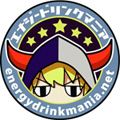 Author: Energy Drink-kun
Author: Energy Drink-kun
In 2001, while living in the United States, I encountered energy drinks through the dance scene and was deeply impressed. After returning to Japan, I found that energy drinks were considered novelty beverages, so I established a comprehensive website in 2013 to share the true appeal of energy drinks. As an energy drink enthusiast, I began drinking them seriously again, collecting over 7,000 varieties of energy drinks from various countries. I am also active as a critic and expert, receiving media interviews.


 Since 2001, Energy Drink Maniac has been drinking energy drinks and providing the most detailed reviews of global energy drinks based on firsthand research.
Since 2001, Energy Drink Maniac has been drinking energy drinks and providing the most detailed reviews of global energy drinks based on firsthand research.